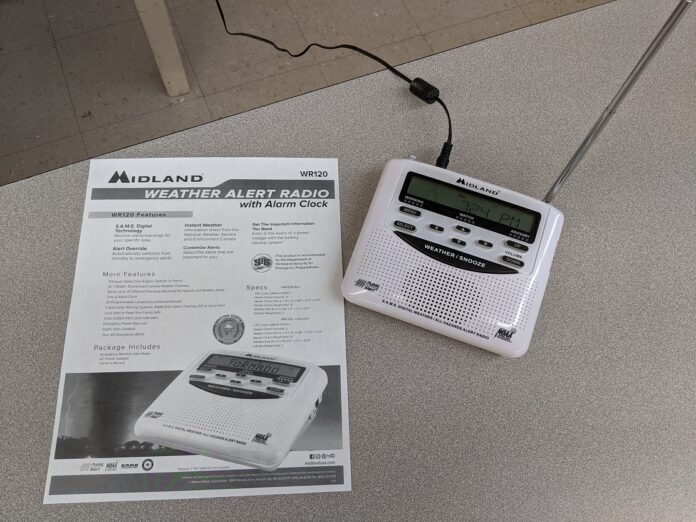
CULLMAN COUNTY, Ala. – As residents across the county seek safety during bad weather, The Tribune sought input from various sources about the value of community sirens, household radios, personal device apps and other means of communication in giving effective warnings to people in the path of dangerous storms.
Weather radios and device apps are considered crucial by the National Weather Service, emergency managers and meteorologists alike. Community sirens, which some local officials have opted out of maintaining, generally land at the end of lists, though they still have a certain function.
Where are the sirens?
Outdoor warning sirens are located at:
- Joppa VFD
- Baileyton
- Holly Pond
- Hanceville (3)
- Good Hope (2)
- Smith Lake Park
- Arkadelphia
- Fairview
- Dodge City (2)
- Garden City (3)
- Welti (Berlin VFD#2)
- West Point (2)
- Loretto VFD
- Jones Chapel VFD
- Logan VFD (2)
- Bethsadia VFD
- Colony
- Vinemont
- Cullman (6)
- Sardis VFD
- Cold Springs VFD
- Battleground VFD (2)
- Crane Hill VFD
- Vinemont/Providence VFD #1
- Walter VFD
- Gold Ridge VFD
- Brushy Pond Senior Center
The current system has 42 functional sirens. All but two have a maximum coverage area of a one–mile radius. The sirens at Smith Lake Park and Arkadelphia have a one-half mile radius.
Cullman County Emergency Management Agency (CCEMA)
CCEMA director Phyllis Little told The Tribune, “Cullman County has an Outdoor Warning System (sirens); it is designed to alert people that are outdoors. This is the reason for most siren locations being at schools, fire stations, parks, etc., where there are large groups engaged in outdoor activities. The first siren was installed in Joppa in 1996. The siren tone should let you know that something may be wrong and you need to get more information via radio, TV, weather radio, a phone app. You may not be able to hear the siren tone indoors for various reasons: radio, TV or appliance noise, construction of the building you are in, weather conditions, etc. How loud the tone you do hear is dependent upon the distance you are from the siren itself. Maximum range for sirens in Cullman County is one-half–mile to one-mile radius. On a clear, cool day, the sirens can be heard at farther distances.
“Sirens in Cullman County are battery operated and the batteries are recharged using a ‘trickle charger.’ On a day like April 27, 2011, batteries were depleted early and, since power was out across the county, the trickle charger could not recharge them. Recharging to maximum power takes 24 hours. Residents should never depend on the outdoor warning system as their primary alert notification.
“Residents should have multiple ways to receive weather alerts—NOAA Weather Radios are efficient, they can be set to receive only the alerts desired—thunderstorm watch, thunderstorm warning, tornado watch, tornado warning, etc. They operate on both electricity and batteries. They are portable, meaning you can carry it from your house to your shelter. They are relatively inexpensive, usually around $30-$40.
“The sirens are only activated for tornado warnings. However, we experienced a tornado last month that was not warned. The storm developed quickly as part of a severe thunderstorm that was moving across the county. Residents with a weather radio or personal device apps would have received the thunderstorm warning. This would have alerted them to the seriousness of the storm and further development. Cullman County EMA has worked with the local school systems to ensure that weather radios are located at each one.
“The EMA continues to encourage residents to download apps to their phones to ensure that they have access to the most current weather information whether they are at home, work or traveling. Many apps are free—AL Saf-T-Net, TV stations.”
WAFF 48 (Huntsville) meteorologist Eric Burke
Burke said, “Community storm sirens are intended to warn people who are outside and should never be used as the lone method to receive severe weather warnings or civil emergencies. We always encourage people to have multiple ways to receive warnings as they are issued by the National Weather Service. The NOAA Weather Radio is the tried and tested method that is nearly fail proof if programmed correctly. The battery backup is vital in the event you lose power. A Midland Weather Radio is a good model; they usually run about $30 at a sporting goods store.
He continued, saying,
“Cell phones with EAS capability have become the norm over the past few years, as well. I would have to use this opportunity to plug the WAFF 48 Weather app, free for Android and iPhone. It will follow your location if you choose to and will give you all severe weather watches and warnings. You can also stream our coverage from the app itself during severe weather.”
ABC 33/40 meteorologist James Spann
Spann said, “People need at least two reliable ways of getting warnings; never, ever a siren. They have never been effective in reaching people in a home or business. If that is how you get warnings, you pretty much don’t have any hope. They only reach a limited number of people outdoors.
“Every Alabama home needs a NOAA Weather Radio; most get the Midland WR-120 sold in local retail stores. The other way, of course, is a cellphone. Be sure “emergency alerts” are enabled, and get a good weather app. Needless to say, I am partial to the ABC 33/40 Weather app.”
New notification system on the way
The Cullman County Commission on April 20 approved a CCEMA contract with the American Signal Corporation for a mass notification alert system that can send voice calls to landlines along with emails, texts and SMS short messages to alert county residents about weather emergencies. The system will also be able to post alerts directly to the CCEMA Facebook page.
In addition to weather, an unlimited number of administrators on the system will allow local municipalities, the County Parks and Recreation Department and others to use the system to send notices about upcoming events.
Residents who use the system will be able to customize settings to receive all notifications or only weather alerts. They can even specify what kinds of weather alerts they want to get: watches, warnings, only tornadoes and other choices.
A schedule has not been set for the system to be online in the county.
Copyright 2021 Humble Roots, LLC. All Rights Reserved.






























